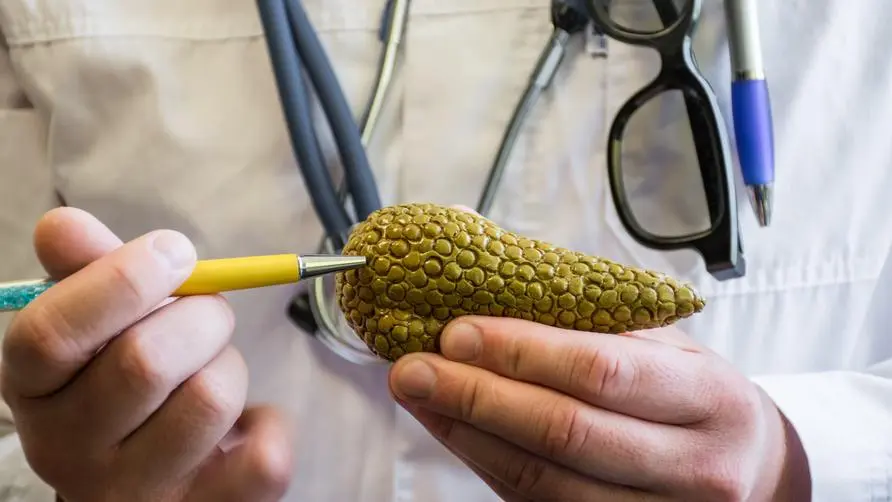"Cancer King" The mortality rate of pancreatic cancer without signs exceeds 80%? Does tumor location correlate with symptoms? How can I survive the longest with treatment?

Pancreatic cancer is highly malignant and prone to metastasis, and its mortality rate accounts for more than 80% of diagnosed cases.
Taiwan and abroad It is reported that celebrities have passed away due to pancreatic cancer, and the time from diagnosis to death is relatively short, which is often shocking. Dr. Wu Jiaoen from the Oncology Department of Linkou Chang Gung Memorial Hospital pointed out that more than 90% of pancreatic cancers generally refer to “adenocarcinomas” grown from exocrine tissue. They are highly malignant and easy to metastasize, and the treatment effect is not ideal.
According to the 2017 cancer registration data, 2,469 people were initially diagnosed with pancreatic malignant tumors, and 2,082 people died from pancreatic tumors. Looking at the numbers alone, the one-year mortality rate exceeds 80%. Pancreatic cancer is therefore known as the “King of Cancers” is called.
Why is pancreatic cancer difficult to detect? What are the differences in symptoms of tumors in different locations?
Pancreatic cancer is notoriously malignant, and there may not be obvious signs when it occurs. Dr. Wu Jiaoen said that there are three main reasons why pancreatic cancer is difficult to detect early: first, the early symptoms of pancreatic cancer are not obvious; second, it is difficult to detect pancreatic tumors by ultrasound; third, pancreatic tumors are difficult to detect in the early stage. Metastasis occurs easily at a very young age.
In addition, symptoms may vary depending on the location of the tumor. Dr. Wu Jiaoen explained that tumors in the “head” of the pancreas can cause bile duct obstruction and jaundice symptoms, and are easier to detect early. However, if the tumor grows in the “body” or “tail” of the pancreas, it usually has to grow to a certain size to cause pain, and is accompanied by symptoms such as loss of appetite and weight loss. Pancreatic cancer may not be diagnosed until 3 to 6 months after symptoms appear.
The chance of pancreatic cancer recurrence is 80%? Do I need chemotherapy after surgery?
Dr. Wu Jiaoen pointed out that the staging of pancreatic cancer is mainly based on the size of the local tumor and whether it has invaded surrounding vascular tissue. And whether there is local lymph node metastasis (stages 2 to 3) and whether there is distant spread and metastasis (stage 4). Clinically, only about 20% of patients are suitable for surgical resection. The other patients need to receive systemic chemotherapy and then evaluate whether the tumor can be removed.
Dr. Wu Jiaoen said that even if the tumor is removed, pancreatic cancer patients still need to receive adjuvant chemotherapy to reduce the recurrence rate and increase the chance of survival. However, only about 20% of patients have no recurrence after surgery, and the other 80% of patients will still face tumor recurrence after surgery, and the tumors may also progress to advanced stages.
Currently, pancreatic cancer treatment can be treated through a multi-specialty team, including general surgery, medical oncology, gastroenterology and hepatobiliary surgery, radiology, and pathology, to discuss staging and surgical possibilities. Dr. Wu Jiaoen said that it has recently been discovered that the use of “preemptive chemotherapy” can shrink tumors before surgery, thereby increasing the patient’s chances of receiving surgical treatment in the future.
How is advanced pancreatic cancer treated? What are the side effects of systemic chemotherapy?
When pancreatic cancer progresses to an advanced stage and is inoperable or has distant metastasis, systemic chemotherapy is the current treatment of choice. Dr. Wu Jiaoen pointed out that in addition to considering the effect of systemic chemotherapy, it is also necessary to consider whether the patient can tolerate side effects, including nausea, vomiting, mouth sores, diarrhea, decreased blood cells, etc. In addition, the patient’s own nutritional status and whether he or she has gastrointestinal symptoms also need to be considered.
Dr. Wu Jiaoen said that the combination of systemic treatment and the longest-lasting prescription in current clinical trials is three chemotherapy drugs combined with one adjuvant drug. The median patient survival can be up to 11.1 months, and the tumor control rate is reached 70.2%, and the median survival time without deterioration was 6.4 months, which is nearly twice the survival time of traditional treatment. Taiwan also currently receives health insurance benefits. The only disadvantage is that the side effects are greater and the patient’s symptoms are more obvious.
Dr. Wu Jiaoen pointed out that research on different combination treatments for pancreatic cancer is still ongoing, and the treatment effects have improved compared with the past. Some patients will experience mild nausea, vomiting, diarrhea, mouth sores and other symptoms when they first take medicine, but after good medication adjustment, most patients will be relieved. Patients with pancreatic cancer are reminded to communicate with doctors and cooperate with multi-specialty medical team care to obtain a better quality of life.
Fan page of Dr. Wu Jiaoen: Dr. Wu Jiaoen, Department of Oncology




